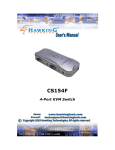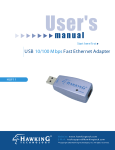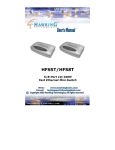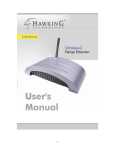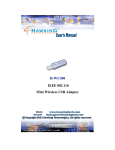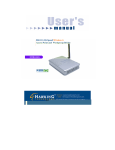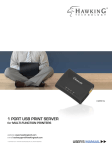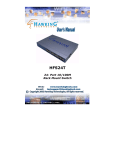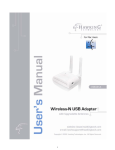Download Hawking Technology H-DS20L Network Card User Manual
Transcript
H-DS20L USB 2.0 Docking Station FCC Warning This equipment has been tested and found to comply with the regulations for a Class B digital device, pursuant to Part 15 of the FCC Rules. These limits are designed to provide reasonable protection against harmful interference when the equipment is operated in a commercial environment. This equipment generates, uses, and can radiate radio frequency energy and, if not installed and used in accordance with this user’s guide, may cause harmful interference to radio communications. Operation of this equipment in a residential area is likely to cause harmful interference, in which case the user will be required to correct the interference at his/her own expense. CE Mark Warning This is a Class B product. In a domestic environment, this product may cause radio interference, in which case the user may be required to take adequate measures. VCCI Mark Warning LIMITED WARRANTY Hawking Technology guarantees that every USB Docking Station is free from physical defects in material and workmanship under normal use for two (2) years from the date of purchase. If the product proves defective during this two-year warranty period, call Hawking Customer Service in order to obtain a Return Authorization number. Warranty is for repair or replacement only. Hawking Technology does not issue any refunds. BE SURE TO HAVE YOUR PROOF OF PURCHASE. RETURN REQUESTS CANNOT BE PROCESSED WITHOUT PROOF OF PURCHASE. When returning a product, mark the Return Authorization number clearly on the outside of the package and include your original proof of purchase. IN NO EVENT SHALL HAWKING TECHNOLOGY’S LIABILTY EXCEED THE PRICE PAID FOR THE PRODUCT FROM DIRECT, INDIRECT, SPECIAL, INCIDENTAL OR CONSEQUENTIAL DAMAGES RESULTING FROM THE USE OF THE PRODUCT, ITS ACCOMPANYING SOFTWARE OR ITS DOCUMENTATION. Hawking Technology makes no warranty or representation, expressed, implied or statutory, with respect to its products or the contents or use of this documentation and all accompanying software, and specifically disclaims its quality, performance, merchantability, or fitness for any particular purpose. Hawking Technology reserves the right to revise or update its products, software, or documentation without obligation to notify any individual or entity. Please direct all inquiries to: [email protected]. 2 Basic Overview……………………………………………………………………...…….4 Safety Instructions………………………………………………………………...4 Introduction……………………………………………………………………….4 Features…………………………………………………………………………...4 System Requirements……………………………………………………………..5 Package Contents…………………………………………………………………5 Supported Operating Systems…………………………………………………….5 Technical Specifications…………………………………………………………………..6 Hardware Installation…………………………………………………………………..…7 Software Installation………………………………………………………………………9 3 SAFETY INSTRUCTIONS 1. 2. 3. 4. 5. Always read the safety instructions carefully. Keep this User’s Manual for future reference. Keep this equipment away from humid environments. Lay this equipment on a reliable, flat surface before setting it up. If any of the following situations arise, have the equipment checked by a service personnel: The equipment has been exposed to moisture The equipment has been dropped and/or damaged The equipment has obvious signs of breakage The equipment has not been working correctly or you could not get it to work according to the User’s Manual. INTRODUCTION Hawking Technology’s USB 2.0 Docking Station is a unique expansion unit specially designed to transform a Notebook Computer into a desktop equivalent. It provides several desktop system connectivity capacities. The USB docking station allows you to add up to four USB ports to your PC and up to a total of 127 additional hubs and other devices. Installing the USB Docking Station is simple - there are no confusing cables, plugs, or IRQs (Interrupt requests) to worry about. Just plug in your peripherals and begin using them without re-booting your PC. FEATURES One USB Upstream Port Supports Full Speed (480Mbps). Two USB Downstream Ports One PS/2 Keyboard Port One PS/2 Mouse Port One USB File Transfer data link port One Serial Port One Printer Port Standard IEEE-1284 parallel port The Docking Station Uses USB self power One 10/100 Ethernet LAN port (USB 2.0 Hi-Speed Docking Station With LAN only) 4 SYSTEM REQUIREMENTS PC or Mac MS Windows 98SE, ME, 2000, XP & Mac OS9.x & 10.1 Available USB Port 64 MB RAM or above Pentium 233 MHz or higher PACKAGE CONTENTS Docking Station – 1pc DC5V Power supply - 1pc User’s Manual - 1pc Software driver CD-ROM - 1pc Type-A to Type-B USB Cable - 1pc SUPPORTED OPERATING SYSTEMS Windows 98SE, ME, 2000, XP Mac OS 9.x and OS 10.1 5 Type Docking Station With LAN Computer Port 1 upstream port Type B receptacle I/O Ports 2 USB 2.0 downstream ports, Type A receptacle 1 PS/2 Keyboard port Mini Din 6-pin 1 PS/2 Mouse port Mini Din 6-pin 1 File Transfer port Type B receptacle 1 serial port DB 9-pin male 1 parallel port DB 25-pin female Emission Power 1 10/100M LAN port 8P8C RJ-45 shielding CE, FCC AC Input 100 V~240V DC Output 5V, 2.5A Environments Operating temperature: 0C~70C Storage temperature: -40C~70~C Humidity: 90% RH (No condensing) 6 LED Status Indicators Once the USB Port Replicator is connected, the Hub Link LED is lit green and the LAN LED is lit after the Ethernet cable is connected. Type Docking Station w/ LAN # of LEDs Color Descriptions 1 2 2 Red The AC to DC power adapter is plugged into the power port Green When any of the hub ports, which are connected to USB devices, are activated. Green The LED for your Ethernet LAN port is to indicate 10/100 Mbps speed. Figure 1. USB Port Replicator Ports Any USB port LAN Port PS2 mouse & keyboard connector Connect to RS232 device Connect to Printer Link to another PC (II) 7 Figure 2. Upstream Port and Power Connector Connect to power adaptor Connect to PC (I) Connect the power adapter and plug it into the back of the docking station. Find an unused electrical outlet and plug it in the power adapter. Plug the flat end (A plug) of the USB cable into a free USB port on your PC. Plug the square end (B plug) of the USB cable into the USB upstream connector located on the back of the docking station. At this point, Windows will automatically find the docking station and start installing its drivers. Windows will prompt you for the software. See the next section for details on how to install the software. If you are not sure what version of Windows you are running, click on “Start”, “Settings”, “Control Panel”, then double-click on “System.” An applet will appear and provide you with your system’s information. 8 1. Two-Port Hub Before you connect a USB device to one of the Hub ports, please follow the software installation instructions provided in the subsequent pages of this User’s Manual. 2. PS/2 ports (Keyboard and Mouse port) If you connect a PS/2 keyboard or mouse to the docking station and you are using a PC, you will not need the software driver. However, if you are using a Mac, you will need to install the software driver on the CD-ROM onto your computer. The software drivers also allow Mac users to access PS/2 ports. To do this, please access the file name “USB_PS2_Converter” which is located on the Mac directory of the CD-ROM. 3. File Transfer Port You will need a type-A to Type-B USB cable (included in the package) for connecting two PCs, two Macs, or a PC and a Mac. For Windows, please access the root directory of the CD-ROM. For Macs, please access the file name “Installer”. Please refer to the “Operation” section for further instructions/clarifications. NOTE: At the time of this user’s manual publication, the file transfer port supports the software drivers for Windows 98, 2000, ME, XP and Macs. 4. Serial Port If you connect a serial port device (e.g., Modem) to the docking station and the docking station is connected to a PC, you will need to reset the upstream port. Because serial ports do not have hot plug and play interfaces, you must reset this function to locate your device on the serial port. 5. Parallel Port You can attach your computer to most parallel printer devices through this port to get a faster printing result. 6. LAN port (only for Docking Station With LAN) This port is designed to support 10/100 Mbps Ethernet. It also complies with the IEEE 802.3u, 100BASE-TX, and IEEE 802.3 10BASE-T standards. 9 Installation for Windows 98SE & ME 1. The H-DS20L Install wizard searches for new drivers. Click Next to continue. 2. Select "Search for the best driver for your device [Recommended]," and click Next to continue. 10 3. Select "CD-ROM drive", and click Next to continue. 4. Windows will now search for the driver file for the device. Click Next to continue. 11 5. Windows has finished installing the software. Click Finish to end the Wizard. * NOTE: Repeat the previous steps as needed. 6. If your operating system is Windows ME, click No to continue. Otherwise, click Yes to reboot your computer. 12 7. The "Welcome to the Install Shield Wizard for PC-Linq" dialog window appears. Click Next to continue. 8. Setup will add the program icon to the Program Folder listed below. Click Next to continue. 9. Windows has finished installing the software. Click Finish to end the Wizard. 13 10. The PC-Linq icon will appear on the desktop. Installation verification Because the docking station is USB 2.0, the hub driver is based on the host device. The device name may vary on your host device driver. Windows 98SE 14 15 Windows ME 16 17 Installation for Windows 2000 1. The H-DS20L Install wizard helps you install a device driver. Click Next to continue. 2. Select "Search for a suitable driver for my device [recommended]." Click Next to continue. 18 3. Select "Floppy disk drives" and click Next to continue. 4. The wizard found a driver. Click Next to continue. 19 5. Select "C:\WINNT\system32\drivers" for built-in hub driver (usbhub20.sys). Click Open to continue. 6. Click OK to continue. 20 7. Windows has finished installing the software. Click Finish to continue. 8. This wizard helps you install a device driver. Click Next to continue. 21 9. Select "Search for a suitable driver for my device [recommended]." Click Next to continue. 10. Select CD-ROM drives and click Next to continue. 22 11. The wizard found a driver. Click Next to continue. 12. Windows has finished installing the software. Click Finish to continue. * NOTE: Repeat the previous steps as needed. 23 13. The "Welcome to the Install Shield Wizard for PC-linq" dialog window appears. Click Next to continue. 14. Setup will add the program icon to the Program Folder. You may type a new folder name, or select the default folder name. Click Next to continue. The PC-Linq icon will appear on the desktop. Note: If you connect the docking station to a PC via a USB 2.0 port, PCI card, or hub, it will ask for the operating system for the USB 2.0 driver. 24 Installation verification Because our docking station is USB 2.0, the hub driver is based on the host device. The device name may vary on your host device driver. Windows 2000 25 Installation for Windows XP 1. The H-DS20L Install wizard helps you install a device driver. Select "Install the software automatically [Recommended]." Click Next to continue. 2. Click Continue Anyway. 26 3. The wizard has finished installing the software. Click Finish to continue. * NOTE: Repeat the previous steps as needed. 4. The "Welcome to the Install Shield Wizard for PC-linq" dialog window appears. Click Next to continue. 27 5. Setup will add the program icon to the Program Folder. You may type a new folder name, or select the default folder name. Click Next to continue. The PC-Linq icon will appear on the desktop. Note: If you connect the docking station to a PC via a USB 2.0 port, PCI card, or hub, it will ask for the operating system for the USB 2.0 driver. 28 Installation verification Because the docking station is USB 2.0, the hub driver is based on the host device. The device name may vary on your host device driver. Windows XP 29 30






























